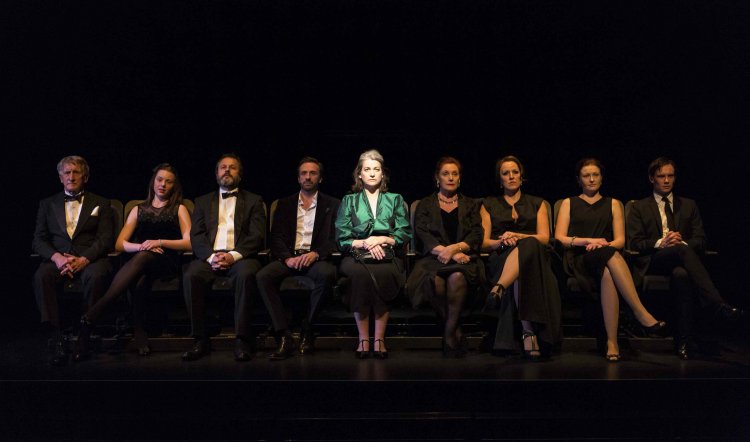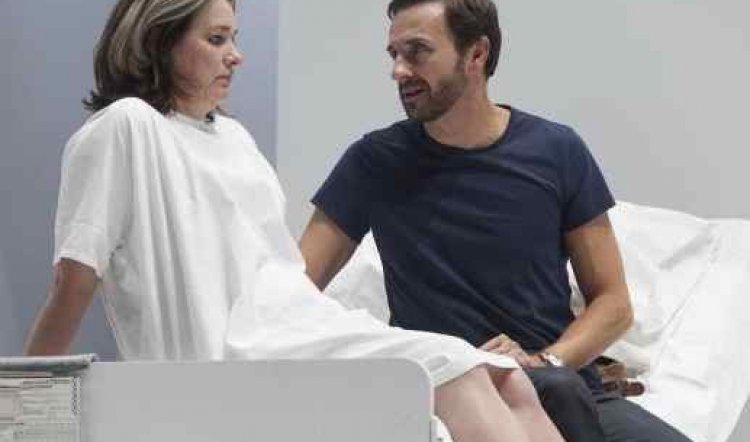
FACE TO FACE
FACE TO FACE, Sydney Theatre Company at the Sydney Theatre, 7 August-8 September 2012. Photos by Brett Boardman, main pic: the cast; right Kerry Fox and Mitchell Butel.
The female mental breakdown is, not surprisingly, a favoured dramatic theme in popular culture, movies in particular.Notably and in no particular order there's Women On The Edge of a Nervous Breakdown, Pedro Almodovar's 1988 semi-farce approach to the topic; The Pumpkin Eater (1964) sees Anne Bancroft taking neurosis to hitherto unheard of depths of gloomy realism. The fragile tragedy of A Streetcar Named Desire has fascinated audiences in theatre and cinema since 1947 (and skewered Sydney and New York through Cate Blanchett's seminal performance in 2009). And somewhere in there - among many others - is Ingmar Bergman's 1976 movie, Face To Face.
As you may already know, Belvoir's writer-director Simon Stone was engaged to direct a production for STC and decided he wanted to adapt Face To Face for the stage. He enlisted the support of designer Nick Schlieper, then STC co-artistic director Andrew Upton lent his specific talent and experience as an adapter of existing works and the result is a satisfying and marvellously entertaining "new" work.
Face To Face is a close-up of a woman in emotional freefall. The kind of helpless tumble through everyday normal stuff that is fearfully familiar to many women. There is no apparent cause, no apparent reason, to the point where the descent into misery and hopelessness can seem - to others - to be a self indulgence. Maybe it is, but it doesn't make it any less painful or desperate. Just because it's so First World doesn't diminish the horror.
What makes this particular fall from social grace so unacceptable in this day and age is that Jenny - the woman on the edge of this particular nervous breakdown - is a successful psychiatrist. Dr Jenny Isaakson (Kerry Fox) is supposed to be the one at the helm, in control; the one who gives hugs and reassurance and does not teeter. Ever. So when she not only teeters but plunges headfirst into the abyss, it is the most unacceptable form of bad manners. Not coping is so 2008.
The play is divided into two distinct phases and begins with Jenny enduring a thankless and provocative session with a young patient, Maria, (Anna Martin) whose personal rage is directed straight at Jenny in an attempt to shake her out of her professional calm and detachment. The scene actually sets the style of what follows as Maria scoots back and forth across the empty stage on a wheeled office chair, her manic and aggressive progress followed uncomplainingly by her therapist. It is noisy and almost comic but it's also disturbing and as the play progresses this horizontal movement is echoed by the various bits of scenery that are (silently) moved on and off, back and forth by other members of the cast. It suggests both reality and its unnerving opposite; and the effect is to almost imperceptibly heighten and alter perception of Jenny's world.
One of the more painful features of inner disintegration is that it tends to happen in full view of others who are more or less helpless or unwilling to understand or intervene. So it is with Jenny. As life spins around her, her isolation is made more pointed by the close proximity of others. Her aunt and uncle (Wendy Hughes and John Gaden) are kind enough but entirely wrapped up in their own world. They are preoccupied by his descent into senility and her determination to maintain the fussy control that has been her life's work. Along the way however they provide glimpses of Jenny's early life and it becomes apparent why she is crumbling. These two are alternately comical and heart-rending and underline the depth of talent in this cast.
As a would-be dalliance Tomas, Mitchell Butel is at once charming, apparently sympathetic yet also indefinably menacing - in the nicest possible way. His easy manner is Jenny's counterbalance and the effect is to dislodge her from her precarious toehold on reality and seemingly hasten the inevitable. Along the way, Jenny irritates the bejesus out of her associate Wankel (Humphrey Bower) and more than puzzles his energetically suburban-swinger wife Elizabeth (Queenie van der Zandt) in one of the better party scenes to be seen on a stage.

Adding to Jenny's profound unease is her teenage daughter Anna (Jessica Nash); a girl whose youth and insecurity means she was assured of feeling her mother's mental isolation as a lack of love. And even more affectingly, the young man Michael (Dylan Young) tells Jenny of his acute unhappiness and its consequences in a textbook description of why and how he should find himself at such a low ebb.
The (visual) tipping point for the audience is when Jenny sits on her bed neatly shovelling Nembutal into her mouth. In a coupe de theatre that shouldn't be spoiled by description, she enters the dream world of overdose and its aftermath. Whether she is hallucinating, whether it's real or imaginary is up to you - the realisation of it by Nick Schlieper and his associates David Fleischer and Chris Twynam - is mesmerising.
In his program essay Keith Gallasch writes of Bergman's works that they continue, "… to reveal their genius and immediacy and, above all, their pertinence to a society now short on empathy, wary of solitude and direct engagement and, with ever-welling separation anxiety, afraid of a life unplugged." And it's is especially true of this stage adaptation of Face to Face.
If the above sounds grim and not the kind of thing you fancy on a Wednesday afternoon - or whenever - then I'm sorry, because that's not my intention and it certainly isn't how it should be perceived. Face to Face is richly entertaining, deeply moving, extremely thought-provoking and has remained in my thoughts since seeing it. In his program essay (yes,the program is well worth a leisurely read) Simon Stone writes, "It is a warning cry against the self-help culture, against the idea that happiness is a box you can tick rather than a passing moment to be caught when you can catch it, against ignoring today's worries in pursuit of numbing contentment, against self-denial for survival's sake. It encourages us to face the void and see it for what it is - an unknowable place full of horrors and joys, in equal measure exciting and terrifying, painful and exquisite, there to be experienced as long as we don't close our minds to it."
He wasn't writing about his production or life in general but it's a perfect description of both. If you want fairy floss go elsewhere, if you want to get your teeth, heart and mind into something truly substantial and rewarding - Face to Face is the play for you.



